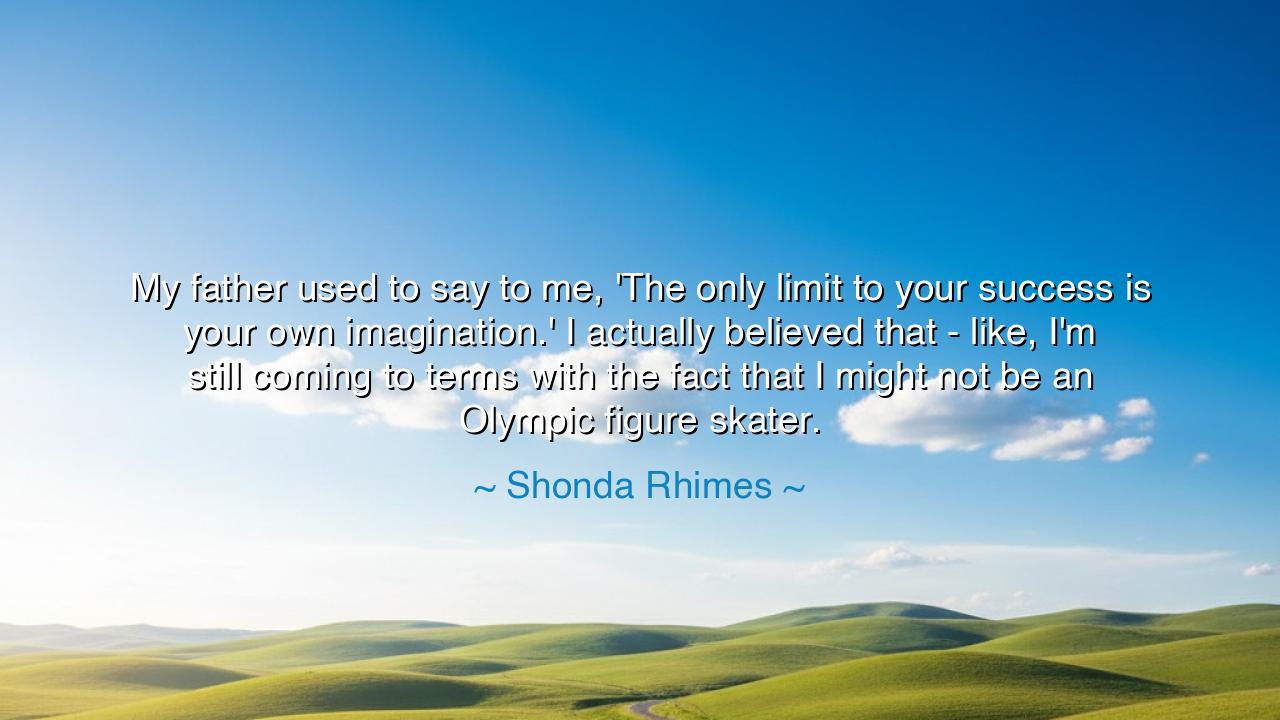
My father used to say to me, 'The only limit to your success is
My father used to say to me, 'The only limit to your success is your own imagination.' I actually believed that - like, I'm still coming to terms with the fact that I might not be an Olympic figure skater.






“My father used to say to me, ‘The only limit to your success is your own imagination.’ I actually believed that — like, I’m still coming to terms with the fact that I might not be an Olympic figure skater.” — so speaks Shonda Rhimes, the great storyteller of our age, whose worlds of passion, ambition, and brilliance have ignited the imaginations of millions. Beneath her humor lies a truth both tender and profound: that the imagination is the first and greatest power of humankind — and that faith in it, once planted by a parent’s words, can shape a lifetime. Yet she also reminds us, gently and with laughter, that imagination must walk hand in hand with reality, lest we lose ourselves in dreams that were never meant to be.
Her words reflect the ancient paradox between limitless vision and the boundaries of human form. When her father told her that success was bound only by imagination, he was invoking one of the oldest teachings known to humankind — that the mind is the birthplace of destiny. Every triumph in history, every invention, every work of beauty, first existed in someone’s unseen world. To believe in the power of imagination is to believe that one’s inner vision can shape the outer world. It is a teaching both divine and dangerous: divine, because it awakens courage and creation; dangerous, because without humility, it can lead one to deny the simple truth of being human.
Rhimes speaks these words with the wisdom of one who has lived both sides of this truth. Her life itself is proof that imagination, when joined with discipline, can conquer impossibility. A Black woman writing and producing some of the most successful television shows in history — Grey’s Anatomy, Scandal, Bridgerton — she did what many told her could not be done. She reshaped the stories that shaped culture. She dreamed, and then worked until those dreams took form. Yet, with humor and honesty, she acknowledges the other side of imagination — that though we may believe we can do all things, the world still gives us form and flesh, and we must learn to love the balance between dream and reality.
This lesson echoes through time. Consider the tale of Leonardo da Vinci, who imagined machines that could fly centuries before man took to the skies. His imagination knew no bounds — he drew wings, gears, and engines of wonder. Yet Leonardo never flew; his creations remained on parchment. But were they failure? No — for his imagination planted the seeds that others, generations later, brought to life. In this way, Leonardo’s story, like Rhimes’s words, teaches that imagination’s purpose is not always to be fulfilled by one person, but to open the path for others to follow.
The origin of Rhimes’s quote lies in the intimacy of inheritance — a father’s faith spoken into the heart of a child. Such words, uttered in love, become the soil from which confidence grows. Every parent, every teacher, every elder who tells a child “you can” is shaping the future, for imagination is contagious. Yet Rhimes’s reflection also carries a touch of humor, a humility that keeps imagination from becoming arrogance. To laugh at one’s impossible dreams — to admit, “I might not be an Olympic figure skater” — is to remain human while still reaching for the divine. It is the laughter of wisdom, the joy of knowing that limits do not diminish the beauty of the limitless mind.
From her words we learn that imagination is not about denying limits, but about transcending them in spirit. The one who imagines does not need to do all things; it is enough to imagine greatly, and to act faithfully in the direction of that vision. Imagination gives birth to courage; courage gives birth to work; and work gives birth to success. Rhimes reminds us that though we may not all be Olympians, our imagination can still make us champions — in art, in kindness, in purpose. For in imagining better, we become better.
Therefore, the lesson is this: guard and honor your imagination, but let it walk in truth. Dream widely, but root your dreams in the soil of effort. Let imagination be your compass, but let humility be your guide. Do not mock your dreams, even the impossible ones, for they are the source of all greatness. Laugh, as Rhimes does, but never stop imagining. For the world belongs not to the cynic who mocks dreams, but to the dreamer who dares to make them real — even if, in the end, she cannot skate upon the ice, but can still make the world dance to her story.
And so, let us pass this wisdom to the generations that follow: The only true limit is the one you build in your mind. Imagination is not a promise of all things, but the power to begin anything. Use it well, use it boldly, and when you stumble upon your limits, smile as Shonda Rhimes does — knowing that even in the attempt, you have touched something divine.






AAdministratorAdministrator
Welcome, honored guests. Please leave a comment, we will respond soon